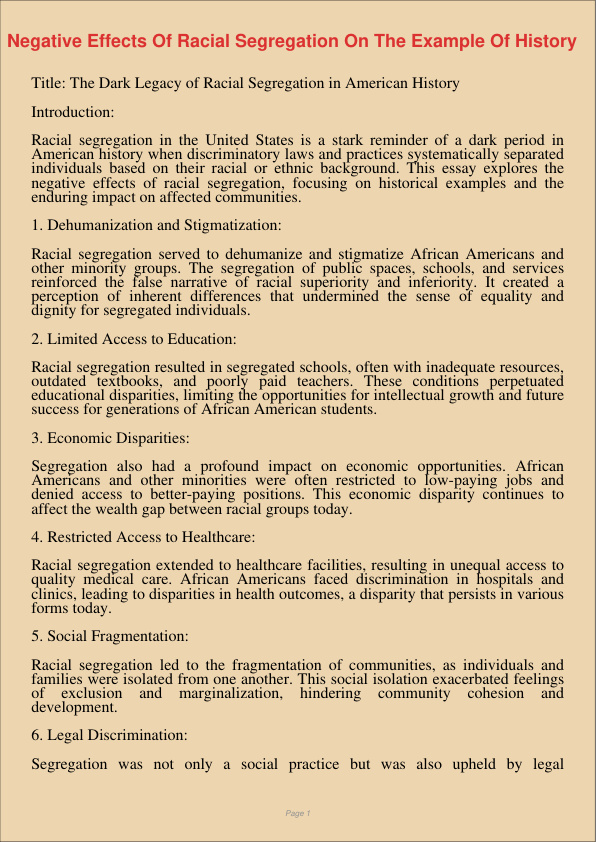Negative Effects Of Racial Segregation On The Example Of History
Jan 8, 2024
racial segregation
negative effects
Business
Macro & Microeconomics
Title: The Dark Legacy of Racial Segregation in American History
Introduction:
Racial segregation in the United States is a stark reminder of a dark period in American history when discriminatory laws and practices systematically separated individuals based on their racial or ethnic background. This essay explores the negative effects of racial segregation, focusing on historical examples and the enduring impact on affected communities.
- Dehumanization and Stigmatization:
Racial segregation served to dehumanize and stigmatize African Americans and other minority groups. The segregation of public spaces, schools, and services reinforced the false narrative of racial superiority and inferiority. It created a perception of inherent differences that undermined the sense of equality and dignity for segregated individuals.
- Limited Access to Education:
Racial segregation resulted in segregated schools, often with inadequate resources, outdated textbooks, and poorly paid teachers. These conditions perpetuated educational disparities, limiting the opportunities for intellectual growth and future success for generations of African American students.
- Economic Disparities:
Segregation also had a profound impact on economic opportunities. African Americans and other minorities were often restricted to low-paying jobs and denied access to better-paying positions. This economic disparity continues to affect the wealth gap between racial groups today.
- Restricted Access to Healthcare:
Racial segregation extended to healthcare facilities, resulting in unequal access to quality medical care. African Americans faced discrimination in hospitals and clinics, leading to disparities in health outcomes, a disparity that persists in various forms today.
- Social Fragmentation:
Racial segregation led to the fragmentation of communities, as individuals and families were isolated from one another. This social isolation exacerbated feelings of exclusion and marginalization, hindering community cohesion and development.
- Legal Discrimination:
Segregation was not only a social practice but was also upheld by legal institutions, such as the Jim Crow laws in the Southern United States. These laws enforced racial segregation, further entrenching discrimination in all aspects of life.
- Psychological Toll:
Racial segregation took a psychological toll on those affected, leading to a sense of inferiority and internalized racism. The constant reminder of one’s status as a second-class citizen weighed heavily on the mental and emotional well-being of individuals.
- Erosion of Trust and Social Capital:
The legacy of racial segregation eroded trust between communities and institutions, making it more difficult to bridge social divisions. This erosion of trust has far-reaching consequences, including disparities in the criminal justice system and political disenfranchisement.
Conclusion:
Racial segregation, a shameful chapter in American history, had far-reaching negative effects that continue to reverberate through society today. It left an indelible mark on the collective memory of affected communities and has had lasting consequences on education, economic opportunities, healthcare, and social cohesion. Recognizing these negative effects is vital in understanding the deep-seated challenges that persist, and in working toward a more just and equitable future where the legacies of racial segregation are fully addressed and rectified.
